Saponaria, Soapwort
Saporis; Bruisewort
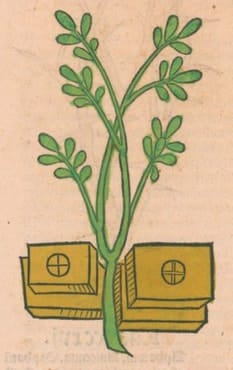
|
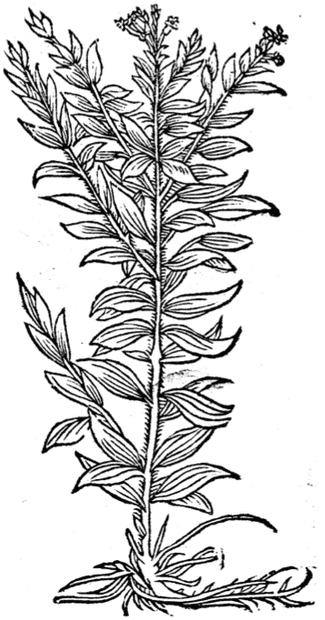
|
|
Ortus Sanitatis, Meydenbach, 1491 |
Dioscorides Materia Medica, Mathias, 1563 |
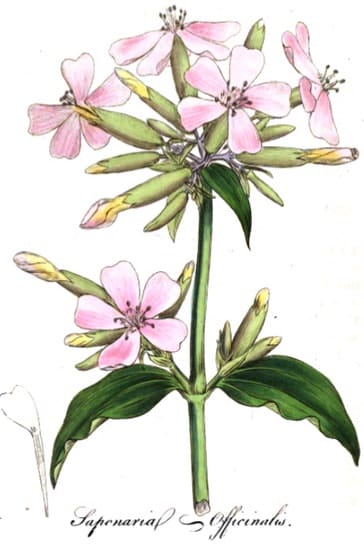 Medical Botany, Woodville, Hooker, Vol. 3, 1832
Medical Botany, Woodville, Hooker, Vol. 3, 1832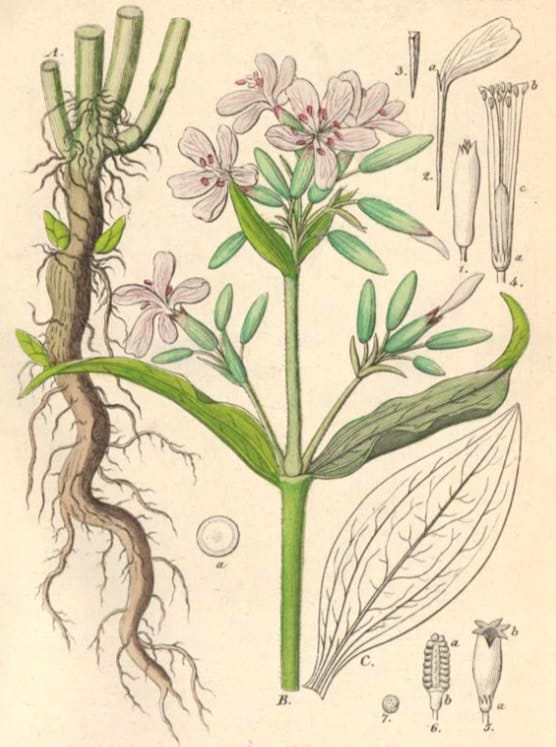 Hand-Atlas Medicinisch-Pharmaceutischer, 1884
Hand-Atlas Medicinisch-Pharmaceutischer, 1884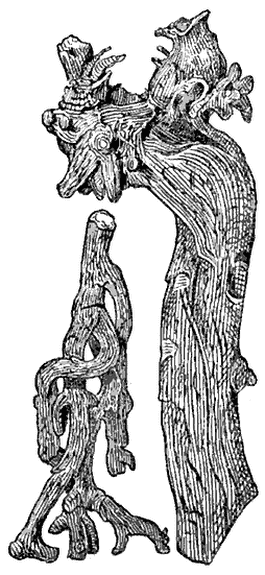 SAPONARIA ROOT
SAPONARIA ROOTNotes on Pharmacognosy, Otto Augustus Wall, 1902
Botanical name:
Saponaria officinalis
Others used similarly include S. vaccaria, the Perfoliate Soapwort.
Parts used:
Root; rarely the leaf
Temperature & Taste:
Mildly Warm, dry. Sweet, Bitter. Slightly Toxic
strongly attenuates
Classifications:
3L. ANTI-TUSSIVE
Uses:
1. Clears Phlegm, Stops Cough:
-Catarrh, chest congestion, Cough, Bronchitis, Whooping Cough, Asthma, Lung diseases (root)
–Commission E approved for Cough and Bronchitis.
-syrup of the juice for Asthma, Wheezing, Shortness of Breath
2. Clears Wind and Damp, Resists Poison:
-Scrofula, Swellings, Tumors
-chronic skin diseases including Scabies, Furuncles, Boils, Eczema, Psoriasis
-herb is used in decoction for Arthritis and Rheumatism, Rheumatic Gout
-Venereal diseases including chronic and obstinate Syphilis; it has been preferred to Sarsaparilla or Guaiacum
3. Moves the Blood, Clears Stasis:
-Wounds, Bruises, Contusions
-Amenorrhea, Dysmenorrhea; passive suppression of menstruation
-cholesterol-lowering effect
4. Clears Damp, Moves the Blood, Opens Obstructions:
-obstruction of the Liver or Spleen
-Swollen Liver, Jaundice and Gall Bladder diseases
-chronic gastrointestinal disorders
5. Clears Damp, Promotes Urine:
-Edema, fluid retention
6. Emetic
-emetic in large doses
7. Externally:
-fresh herb is crushed and applied to fresh Wounds
-fumes inhaled help promote Menstruation.
-as a wash for Venereal Ulcers.
-decoction used as a wash for Eczema and other skin diseases with itchiness
-the powder can be inhaled to cause Sneezing
-externally to discuss all types of Tumors
-gargle for Sore Throat and Tonsillitis
-rheumatic complaints
Dose:
Infusion of the Root (1 in 20): 0.5–1 oz.
Decoction, for Scrofula, Syphilis etc: “Boil down half a pound of the bruised fresh herb in a gallon of distilled water to two quarts, and give from one to three pints in the twenty-four hours”. (The Pharmacopoeia Chirurgica, 1794)
Doses given in modern times are usually low: 500–1500mg
Substitute:
1. Scarlet Pimpernel (Kings)
Main Combinations:
1. Cough and Asthma, combine Soapwort with Coltsfoot, Mullein and Licorice
2. Whooping Cough, Soapwort with Peppermint, Cowslip, Sundew, Violet root, Thyme, Mullein
3. Catarrh, Liver swelling, Syphilis, Arthritis, Jaundice, Rheumatism and visceral obstructions, Soapwort with Watercress, Mother of Thyme and Centaury
4. Chronic Skin diseases:
i Soapwort with Sarsaparilla
ii. Soapwort with Fumitory, Figwort
iii. Soapwort with Dandelion, Centaury, Horehound, Tansy, Camomile (Pharmacopoeia Sardoa, 1773)
Cautions:
1. Avoid overdose or long-term use. Saponins are hemolytic and toxic in overdose.
2. Causes vomiting and diarrhea in full or large doses.
